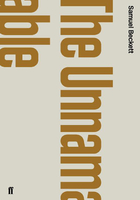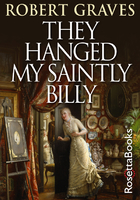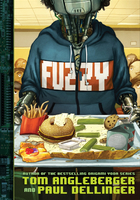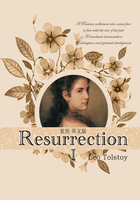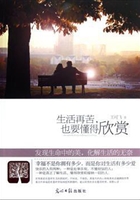During the ensuing days Helen felt as though her mother were continuously present in the house as a large black hole. There was a hole in Dorothy's bedroom, in the bed where she was not, on which, now, the blankets were neatly folded and the cover spread. There were various other holes, where she stood at the kitchen table preparing one of those unappetising stews, or shouting instructions from the landing or inspecting a caller at the front door. There were perambulant holes in which she creaked down the stairs or came in through the front door. Almost, Helen stood aside to let her pass or manoeuvred around her large black airy bulk as she occupied the scullery or the narrow passage by the back stairs. It was weeks before Helen could walk straight through her, or open her bedroom door without bracing herself for the confrontation.
Louise telephoned, almost daily. 'Are you all right?'
'Of course I'm all right.'
'And Edward?'
'Edward's all right too,' said Helen, rather crossly. 'Why shouldn't we be?'
'After all this time. You're so used to her. I mean, I can't quite take it in myself yet. It's a shock.'
'No it isn't,' said Helen. 'We all knew she was going to die.'
'Yes, but we didn't properly believe it. One doesn't. She didn't, certainly, which I suppose was just as well. O gosh…'–Louise's voice trailed away–'I still can't…'
Dorothy, who had seldom had a day's illness in her eighty years, had disputed the diagnosis. She had contradicted it flatly. 'The stupid man says I've got something foul,' she announced. 'I told him not to be so silly.' As the disease progressed she blamed the consultant for ineffective or faulty treatment, baying at him across his desk in the hospital or railing over the telephone. When eventually it reduced her to bed, and at last to a glaring silence, the specialist came into his own, able to commend her fighting spirit. 'Your mother never gave in,' he told Helen and Edward, portentously. 'One can tell the truth to someone like that and know that it will inspire strength rather than despair.' Helen hadn't had the heart to say that her mother had never for one moment believed him. Her dead face had worn, it seemed, an expression of outrage and incredulity.
'You should have a holiday,' said Louise. 'Go off somewhere. Look, we've this friend who's got a cottage in the Lake District…'
'No thanks. I'm too busy. I'm getting back to the library as soon as I've got the house sorted out.'
During the long weeks of her mother's illness Helen had had to take leave from the library. She looked forward, now, to a return to those brisk impersonal days. First, though, there were chores. The paraphernalia of nursing had to be disposed of, bills attended to, those things done which had not been done. She saw that the drooping gutter at the front of the house was now quite unsupported, and that there was yet another slate off the roof. Ron Paget had been asked to come and had not. Foolish to have imagined that one request would suffice. With the back of the Morris Minor piled up with the things for the Red Cross–the commode, the back supports–she stopped off at the yard, spotting Paget loading one of his lorries.
'Mr Paget!'
He came across. They were old sparring partners. He was almost pleased to see her, she saw–gingered up at the thought of a little contest. Over the years there had been plenty: questions of noise and dirt from the yard, the dominant continuous issue of the Britches, Ron's need to keep in with Greystones offset against Greystones' frequent need for minor repairs and services. We have grown middle-aged together, thought Helen. Except that Ron has also grown richer and richer, and shed his dull old wife and got a glossier younger one, and progressed from a beat-up van to a flashy new car every year. The times have been good to Ron. More so than to me. She thought of him as Ron, but always addressed him with formality, for good strategic reasons.
'Mr Paget, you said you'd see to that gutter for us. And the slates.'
'So I did, Miss Glover, so I did. Will do. Tell you what–I'll send a couple of the men over tomorrow morning. How's that?'
'Thanks. I'll expect them, then.'
'A sad time for you,' said Ron piously. 'We've been thinking about you, Pauline and me. You're keeping well, and your brother, I hope.'
'We're fine, thank you,' said Helen briskly. She started up the Morris again.
Ron Paget laid a hand on the bonnet. 'It's done you well, hasn't it, your old jalopy. How old would it be now?'
'I wouldn't know,' said Helen. 'I'm not very interested in cars.'
The Morris Minor, in fact, was fifteen years old but had seldom been more than fifty miles from Long Sydenham. The mileage was barely forty thousand and it was in pristine condition, exquisitely maintained by a fond mechanic at Willough-by's Garage in Spaxton.
Ron, eyeing the Morris, said, 'I'll tell you what, Miss Glover, I've had an idea. I'll do you a favour. My sister's wanting something to potter around in. She doesn't need anything fancy. I'll buy your old rattle-trap off you and do it up for her.' Amazing what a good Morris would fetch now, collector's items, they were. This particular one was hot stuff, in the right market. Old Miss G. wouldn't know that, of course, not in a month of Sundays she wouldn't. 'Get yourself something more up to date,' he went on. 'Nice little Escort, that sort of thing. You deserve it.'
'Do I?' said Helen. 'Well, you may be right.' She got out and contemplated the Morris. 'What do you think it's worth, Mr Paget?'
'Well…' Ron considered. ''Course, they don't make them any more. Gone right out of fashion. You can't get the spares. And that's long in the tooth, that one.'
'Mmn,' said Helen.
'Hartwell's wouldn't look at it. Not as a trade-in for a newish Escort.'
'I daresay not,' said Helen.
'I'd like to do you a good turn, though, Miss Glover. I can tinker about with it myself and see if I can put it to rights. Tell you what, I'll give you five hundred for it.' He slapped the Morris's rump, scraped at a small scratch mark and frowned. 'I'm a fool, but I'm feeling generous. Five hundred.'
'It goes very well still, as it happens,' said Helen. 'I doubt if you'd need to do much tinkering. I'll think it over. Or I could put an advertisement in the Morris Minor Owners' Club magazine. Did you see that article in the Observer?' She got into the car and started up the nicely tuned engine. 'Thanks for the offer, anyway. And that's a promise, is it, about the gutter?'
Ron watched her go. Crafty bugger. Not so daft as she looks. Like the old woman. But where does it get them?
Helen, experiencing the first little glow of pleasure for quite a while, turned out of Ron's yard into the road. In fact, Edward was more in need of a new car than she was. The Morris had many miles in it yet, but Edward's old Beetle (also, one understood, of rarity value nowadays but in this case, alas, too far gone) had packed up again that morning and he had had to go to school on the bus, a tedious process involving a change with a long wait.
Edward taught at Croxford House, a private girls' school catering for the daughters of the more prosperous local farmers, the less prosperous gentry and upwardly mobile business people from Spaxton. It had few educational pretensions. Hardly anyone went on to university. A few of the more aspiring girls took vocational courses and became physiotherapists or nurses. Most settled for clerical work, jobs as receptionists or, if the worst came to the worst, shop assistants. Marriage was very much on the cards, too. There might no longer be any stigma on spinsterhood in Hampstead or Fulham, but down here things were a little different. The girls still married at twenty; marriage remained their objective and the means whereby they acquired status. Mrs Hadley of the Old Rectory gave a great many parties, the purpose of which was to infiltrate her two daughters into the local aristocracy. No nonsense about universities or interesting jobs for them. Here was a tacit agreement on what life for a girl was all about. And Croxford House, while paying lip-service to more up-to-date ways of thinking, would not have entirely disagreed.
Edward taught English, History and Biology to the juniors, and Current Events to the seniors. He was the only male teacher except someone who came on Wednesdays to coach tennis in the summer, and he was regarded with kindly patronage by everyone save the headmistress, who thought him distinguished (in a social rather than an intellectual sense) and had hired him for that reason, fifteen years ago.
The girls liked him. They recognised that his disciplinary powers were so weak that there would simply be no point in challenging them. Also he was amiable, he listened to what they told him with apparent interest, and he never gave them bad conduct marks or reported them to the Head. He demanded little of them, so they demanded little of him. His lessons were gentle, dreamy affairs that seemed to go on and on for ever, with sunlight lying in bars across the desks and flies buzzing at the window. He had long since been removed from teaching duties involving anyone old enough to be within hailing distance of such public examinations as Croxford House bothered with, and simply pottered around with the eleven and twelve year olds in the more decorative areas of English history. He also read to them from books that he himself remembered having enjoyed when he was their age. Modern children's fiction had passed him by. He read Alice, The Wind in the Willows and The Water Babies to the juniors while they handed notes to each other, knitted under their desks or lay with their heads on their arms, apparently asleep. Edward still loved Alice and had never noticed that the children did not. He read, effectively, to himself and was happy. It reminded him of being read to by his mother–except that this was an elusive memory since Dorothy had seldom done so. She was profoundly bored by books. It was Helen who had read to Edward, and subsequently to Louise. What Edward was reviving was a cloudy, luxurious sensation of acquiescence to someone authoritative, more skilled and with access to a wondrous other world. Helen would have been about nine at the time.
Helen, disposing of the invalid equipment in Spaxton, was reminded not of reading to Edward but of her mother's antipathy to the printed word. One of the accelerating problems of her final years had been the entertainment of a vigorous old woman, sound of mind and body, who had no interests.
Dorothy Glover's attention was concentrated on a personal reference system. She read the Births, Marriages and Deaths columns only of The Times, with a practised eye that could pick out any known name in three seconds flat. Novels met with approval only if the setting was familiar. 'I'm extremely fond of Persuasion,' she would say, 'I went to school near Bath. It's by far her best book.' Her knowledge of personal connections was compendious–she knew of cousins unto the tenth degree, she remembered everyone she had ever met, their names, their occupations and their attributes. She knew all this with the dry detachment of an official at Somerset House; she had no interest whatsoever in people as such. She was expert and scholarly in disposing of extraneous material; there was the world which related to her, to which she had been or to whom she had spoken, and there was the rest, which was irrelevant. Needless to say, she could not see the point of history and ignored politics. She never voted. She was a Tory by inclination, but would have denied political affiliations with indignation, claiming that she had no time for politicians and owed her opinions to common sense and using her head. 'Stupid' was her favourite term of abuse; interestingly, though, 'clever' was not a word used in praise. She was more likely to call someone 'too clever by half'.
She read books only for good reason, and noisily when she did so, pointing out the personal resonances whereby the work satisfied her–the familiar place or the name with associations of some kind. She had once written to a well-known novelist to ask if a character in her novel was related to a family of the same name Dorothy had known. The author's polite but acid response had been read to Helen and Edward over breakfast, as they squirmed: 'What on earth does the woman mean–"…your unusually literal view of fiction"? Is she trying to be funny or something?'
As Helen, Edward and Louise grew up they had come to recognise their mother's outlook for what it was. They realised with discomfort that she was not so much egotistical as fettered–trapped within a perpetual adolescence. She moved for ever within a landscape whose only point of reference was herself.
The Red Cross lady received the commode and the backrest with nicely gauged murmurs of sympathy. Helen parked the Morris and set out to do some shopping. Spaxton, a medium-sized market town, supplied all those needs that the village could not meet. Helen and Edward, unfastidious eaters and exceptionally unacquisitive, had fewer needs than most people. Even so, there were occasional requirements. Today, a screwdriver with which to do something about the broken lamp, Earl Grey tea (one of Edward's few indulgences) and a sweater for herself. She walked down the High Street and plunged into the new shopping precinct, a futuristic place in which the shops had no fronts but opened straight into the shining heated covered walk, like some awkward parody of eastern booths. Her mother walked beside her, in her more strident persona of ten years ago, criticising loudly and attracting glances. 'I know,' said Helen. 'I don't care for it either, aesthetically, but I see no reason why people shouldn't have a better choice of things to buy, if that's what they want.'
She stopped to contemplate a display of sweaters. Blue. Interestingly patterned.
'You can't wear that sort of thing,' said her mother. 'It's too young for you. You're fifty-two. And too short and too fat. Louise could get away with something like that, I daresay. Not you.'
'I may be a little more adventurous,' said Helen. 'For a change.'
'Brown,' snorted her mother. 'Brown's right for you. That's what you always wear.'
Helen left her outside and went into the shop. She held garments up against herself and tried to see both face and garment with detachment. The face was–well, unassuming was the word that sprang to mind–neither particularly attractive, nor unattractive either, the complexion better than average, something interesting about the eyes, the chin a touch stubby. She saw age and decay, but did not too much care. She would not have especially wanted to be younger, but would welcome change. Brown, she now observed, sent her face into compliant anonymity; she held up a sweater rich with stained glass window colours–blues and reds and a spice of green–and thought she saw an answering glow above. She bought the sweater. Her mother, waiting outside, made noises of disapproval. 'Well,' said Helen, 'maybe. And again maybe not. We shall see. I shall see. Anyway, I need uplift.' She turned away and her mother, with a curious, unprecedented look of vulnerability on her face, began to fade, like the Cheshire cat in Alice. Help me, she seemed to be saying, save me, keep me. And Helen, with tears pricking her eyes, treacherous and deaf, marched out of the shopping precinct, clutching the sweater, the screwdriver and the packet of Earl Grey tea.
'We've each got a letter from the lawyers,' said Helen.
Edward stood at the kitchen door, eating Puffed Wheat out of a bowl and throwing bread to the birds, who lurked in droves. Greystones, it sometimes seemed to Helen, sustained entirely the local wildlife, if it could be called that; they bought a loaf a day just for the birds, in winter. The garden was festooned with coconuts and mesh feeders as though with exotic Chinese decorations.
Edward turned back into the room, 'I shan't have time to read mine–I'll have to get the bus again. Have you seen a pile of exercise books anywhere?'
Helen opened her letter. Edward prowled the room, went out into the hall and returned, still murmuring plaintively about exercise books.
'It's about mother's Will.'
'Yes,' said Edward. 'Did you see me with them last night, can you remember? Maybe I never brought them back at all.'
'Mother hasn't left Greystones to us. Just the Britches.'
Edward halted. He stared at her.
'The house is left to Phil.'
'Phil?' Edward gaped. 'But why?'
'It's to do with tax. Inheritance Tax. At least up to a point it is. This lawyer seems a bit puzzled. He's a new one. The old one did the Will, apparently, five or six years ago. It's left to Phil because that way some tax is saved, but there is a proviso that we go on living here till our own deaths.'
'Oh,' said Edward. 'Then I suppose it doesn't really make much difference.'
'I suppose not.'
They looked at each other. 'I wonder why mother never told us,' said Edward, at last.
'So do I.'
Edward, now, opened his letter and read it. The letters were identical.
'I don't think Louise is going to be awfully pleased about this,' said Edward.
At that moment the phone rang. Helen went into the hall to answer it.
'I don't believe it!' shrieked Louise. 'What on earth is all this about? What the hell was mother thinking of? It's crazy. Why didn't she ask us about it? Oh God–I can't talk now, I'm half an hour late already and I've got an important meeting. Look, we'll come down on Saturday, we've got to talk about this.'
Helen returned to the kitchen. 'She isn't.'
Edward was hunting for his exercise books again. He opened the bread bin and peered inside. 'Oh dear…Could I have left them on the bus? Louise is furious, is she? Do we have to answer these letters?'
'They're fairly conclusive,' said Helen. After a moment she added, 'I'll ring him up–Mr Carnaby. It does seem to need a bit of explanation.'
'Oh, good,' said Edward, relieved. He lifted the bread board and found his exercise books underneath. 'There they are…! I knew I'd brought them back.' He sounded quite happy now. 'Can I borrow your car this evening–there's a Naturalists' Trust meeting in Spaxton.'
Helen, as she moved around the house that morning, thought about responses to possession. She owned very little: a car (coveted, admittedly, by Ron Paget, which gave it an enhanced status), a wardrobe full of clothes (which no one would covet), some books and knick-knacks. She owned also some stocks and shares left to her by her father, which brought in, nowadays, about a thousand pounds a year. Edward and Louise had received the same legacies when John Glover died in 1958. Everything else had gone to Dorothy, naturally enough. Helen recognised that she, and Edward, and Dorothy herself, for that matter, were not as others are when it came to possession. She seldom wanted anything. Edward was the same. Her mother had hated spending money, not out of parsimony but laziness. Whatever it was in the make-up of most people that responds to the sight of goods for sale had been left out, in their case. Equally, they derived no pleasure from ownership. Helen could just remember a certain frisson induced by an evening dress when she was eighteen, but this had seldom been repeated.
Louise was rather different. Louise had a lot of clothes and a big untidy house in Camden Town crammed with furniture acquired at sales and from junk-shops. She bought pictures and then got tired of them and shoved them in cupboards and bought others. She owned, probably, a considerable bulk of material goods, obtained impulsively and without calculation, and frequently disposed of in the same way. Louise was generous, vague and impatient.
And now Phil owned Greystones.
Pondering this, Helen went out into the garden. Something ought to be done about the garden, she supposed. There were obstacles to anything being done, though, quite apart from apathy. Insecticides could not be employed, nor fungicides or weedkillers or any of those labour-saving devices used by everyone else. Just as mice and moles could not be trapped, or flies and wasps sprayed. Neglect and conservational sensitivity together had turned the garden into a fine acreage of cow parsley, buttercup, dandelion, bindweed and nettle. In fact, Helen rather liked it as it was, though it was annoying not to be able to walk across the lawn without getting wet to the calves. It really should be mown.
Tam was hunched over something, gnawing. As she approached he laid his ears back and began to growl, still frantically gnawing. He had got the withered carcass of a blackbird, Helen saw. 'Drop!' she ordered. Tam snarled and shuffled sideways. Helen seized a corner of the blackbird and tugged. Tam tried to bite her hand, letting go of the blackbird in the process. Helen marched to the rubbish heap with it, Tam mobbing her heels and yapping hysterically. She flung it as high and as far back as she could. Tam watched balefully and then walked off with his whole rear end twitching, as though something were stinging him.
Helen supposed that she would live at Greystones for the rest of her life. She supposed that Edward would also. Edward's attempts to live elsewhere had never come to much. There had been the time when he worked in London with maladjusted children and shared a flat with a man he had been at college with. The children were uncontrollable and scared the wits out of Edward; also, he couldn't stand the traffic noise. After eighteen months he packed it in and returned to Greystones, where he was perfectly happy doing a bit of private coaching and spending the rest of his time on volunteer stuff for the Nature Conservancy people until a casual criticism by some relative sent him into a crisis of conscience. Edward announced that he was thirty-four, had no purpose in life, and ought to be serious about his career. He applied for a job at a minor public school and got it. When, after eight months, he resigned and returned to Greystones, Dorothy was put out. 'What on earth does he want to give up so easily for?' she demanded. 'It's not as though they'd be impossible boys, like that lot in London.' Helen, who knew why, said nothing. Edward got the job at Croxford House and lost that hunted look.
And Helen? Helen, too, had left Greystones. More than once. She had left to go to college, and had returned of course in the vacations. She had taken that first job in the county town fifty miles away, lived in a bedsitter and drifted back to Greystones at weekends. There seemed no reason not to do so, and anyway Edward was usually there. 'Helen's looking for something to do locally,' stated her mother, to those who displayed any interest. 'It's ridiculous her trailing off like this every Monday morning.' And so inevitably the local opportunities had arisen–the part-time work at a school, then at a technical college, and eventually at Spaxton library. Helen herself saw, now, with crystal clarity, the slide from indecision to an inevitable self-perpetuating arrangement; she saw how what might have been an undistinguished but useful career, dignified by such a title, had turned into a series of jobs. At the time, fatal steps are seldom recognised as such. There had been, for so long, the presumption that at any moment something would crop up to provoke change. There had been Dorothy, making assumptions. There had been Edward. And in any case she quite liked Greystones, and was, it would seem, pathologically short of territorial instincts of her own.
So, technically, Greystones now belonged to Phil. Technically, it had belonged before to her mother. Did that matter? Well, of course it matters, thought Helen, but does it matter in any significant way? And, walking back across the lawn with sodden feet, her arms full of lilac with which to cheer up the house, she decided that it did not.
What was significant, of course, what did matter, was their mother's continuing effect; absent, she still prescribed.
'Ludicrous!' stormed Louise.
'Not necessarily. There seems to have been a tax incentive.' Tim, in the big armchair, was the still calm centre. Louise eddied around him. Phil and Suzanne perched on chair arms. Helen and Edward stood at either side of the mantelpiece.
'Mother didn't care tuppence about that sort of thing. Anyway, why didn't she tell us?'
'Ah,' said Tim. 'Now there you have a point.'
'I don' wan' it anyway,' said Phil comfortably.
'You haven't got it,' stormed Louise. 'It's Helen and Edward's home, just like it always has been. It makes no difference.'
'Exactly,' said Helen. 'So there's no need for any of us to get in a fuss about it. It's a technicality.'
'S'right,' Phil agreed.
Louise, glaring out of the window, swung round. 'It's the principle of the thing. In the first place she should have discussed it with us and in the second it's insulting to Helen and Edward technicality or not and frankly how far tax was a consideration I doubt. Mother never had a clue about finance and she wasn't interested so…'
'One assumes that this lawyer…' Tim began.
'Oh, sod the lawyer. Mother would have done what she'd decided to do. She always did. I daresay he put the idea into her head–that's quite possible–but from there on it would have been her. She should have told us, it's insulting to Helen and Edward and it's discriminating between Phil and Suzanne. Suzanne is left her jewellery. Her jewellery! Her jewellery! Her jewellery is that brown bead necklace and her wedding and engagement rings and the regimental brooch with half the stones missing and the copper bracelet for preventing rheumatism. That's what her jewellery is.'
'Oh, shut up, Mum,' said Suzanne. 'I mean, I don't mind. It's silly, all of this.'
'That's not the point. The point is that it's everything for Phil and nothing for Suzanne. The point is also that Phil is a boy and Suzanne is a girl. That's what the point is. Mother is making what might be called a political point.'
'Was,' murmured Tim, his hands folded behind his head, his gaze trained upon the ceiling. 'Was making, darling. Sad to say.'
Louise ignored him. 'It's a blatant piece of anti-feminism. Quite deliberate. Calculated to annoy. She wasn't particularly fond of Phil. She criticised him every time she saw him.'
'She got at me just as much,' said Suzanne.
'Oh, do let's stop talking like this!' cried Edward.
'S'right,' agreed Phil. 'S'all stupid, anyway. Anyone min' if I go for a walk?'
Louise looked for a moment as though she might strike him, then subsided on to the sofa with a groan.
'Think I'll go too,' said Suzanne, following Phil out of the room.
There was a silence. Edward took off his glasses and began to clean them meticulously, a thing he only did when emotionally disturbed; most of the time they were opaque with dust. Helen heard a creak from somewhere upstairs and reminded herself that no, that was not mother. Mother was not heaving herself out of the bed in search of something; there was no need to go up, no need to feel restive. Tim cleared his throat and glanced at his watch.
Louise sneezed violently. 'Oh, Christ…I don't care what they say, it's psychosomatic too. I always get it worse here.' She blew her nose and wiped her eyes. 'Apart from anything else, you realise it makes it difficult if not impossible for you ever to leave Greystones?'
'We don't want to,' said Edward. 'At least I don't.' He looked at Helen.
'How can you know?' Louise bounced to the other end of the sofa. She stuffed a cushion behind her head and lay back.
Tim was restive. 'Darling, I've got a thousand things to see to before…'
'All right, all right. Anyway the kids have pushed off somewhere. How can you know what you might want? Or Helen. I mean, it's perfectly possible that…'
'I doubt it,' said Helen. 'My market value has declined with the years. Come to think of it, I suppose it's even lower now.' She laughed. Tim looked embarrassed.
'That's not what I mean. You know perfectly well that's not what I mean. What I mean is that you don't know what might turn up. Specially now that you're not going to be dancing attendance on mother. Both of you.'
'We never did so very much dancing,' said Edward. 'Not till lately. Mother was always self-sufficient, that you must admit.'
Tim rose. 'Think I'll go and round up the children.' He left.
'Anyone can get married,' said Louise. 'I'm not interested in you getting married. I'm interested in you being able to…to…'
'Go where the wind blows?' suggested Edward. He put his glasses on again, looking unusually clear-eyed. He seemed rather cheerful now.
Louise scowled at him. 'You simply are not taking this seriously.'
'It isn't worth taking seriously.'
Louise swung towards Helen. 'Surely you can see?'
'I stand somewhere in the middle. I think Edward may well be ignoring possible future problems. But I don't think it's something we should get steamed up about. It is, in the last resort, a technical point. It's not going to make any practical difference to any of us.'
'I know, I know. It's the effect.'
'There's nothing that can be done about an effect,' said Helen.
Her own words came back to her that night, standing in front of her bedroom mirror. The new sweater was a mistake, it made her face look not more appealing but disturbingly furtive. It stared out over the unaccustomed colour and pattern with, it seemed to Helen, sly defiance. It was not at home. She took off the sweater, folded it and put it on a shelf of the wardrobe. It would do nicely as a pièce de résistance at the village fete jumble stall.
She got into bed. It was late. Edward had come up some time ago, while she was still pottering in the kitchen. Now, she heard his door open, quietly. The stairs let out a furtive creak. She knew exactly what he was doing. Assuming that she was asleep, he was going down to see if she had set a mousetrap in the larder. If she had, he would spring it with a pencil, guiltily, and not mention the matter. Helen, one step ahead in the mouse battle, now put traps under the sink; Edward–unlike the mice–had so far failed to discover them.

